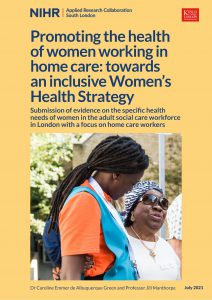 Caroline Emmer De Albuquerque Green, NIHR ARC South London Post-Doctoral Fellow at the NIHR Policy Research Unit in Health and Social Care Workforce, introduces a new report on the promotion of the health of women working in home care, which she co-authored with Unit Director Prof Jill Manthorpe.
Caroline Emmer De Albuquerque Green, NIHR ARC South London Post-Doctoral Fellow at the NIHR Policy Research Unit in Health and Social Care Workforce, introduces a new report on the promotion of the health of women working in home care, which she co-authored with Unit Director Prof Jill Manthorpe.
Women make up the majority of the home care workforce. They provide essential support to people in the community with social care needs. But, the specific health needs of women working in home care have largely gone unrecognised and unmet. The health of home care workers is not just of interest at times of pandemic; it matters in addressing staff turnover, continuity of care for their clients, sickness absences but also the long-term impact on women’s later lives.
 In our report, Submission of evidence on the specific health needs of women in the adult social care workforce in London with a focus on home care workers, we summarised what is known about the specific health needs of women working in home care. The report is co-produced with the assistance of the Proud to Care Board of the Association of Directors of Adult Social Services (ADASS) London which includes home care providers, London Boroughs and other stakeholders.
In our report, Submission of evidence on the specific health needs of women in the adult social care workforce in London with a focus on home care workers, we summarised what is known about the specific health needs of women working in home care. The report is co-produced with the assistance of the Proud to Care Board of the Association of Directors of Adult Social Services (ADASS) London which includes home care providers, London Boroughs and other stakeholders.
We submitted it as evidence to the Department of Health and Social Care’s consultation on a new Women’s Health strategy. From what is known, we concluded the following points to consider in such a new strategy: Continue reading

